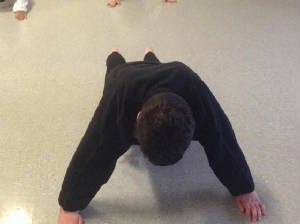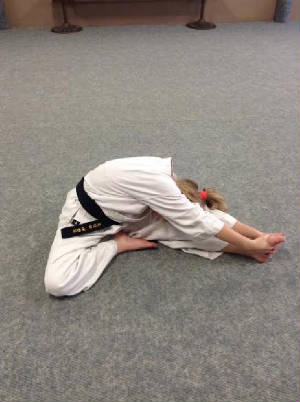|

Tae Kwon Do, also known as Tang Soo Do, focuses primarily on footwork and the open hand approach.
Moo Duk Kwon is the school.
Moo Duk Kwan literally translates to "School of Martial Virtue".
Tae Kwon Do is considered to be a defense-style martial art, a combative technique, a sport, philosphy,
and exercise. Techniques include powerful kicks, jumps, spins, hand strikes, and blocks. Tae Kwon Do teaches confidence
and discipline as well as self-defense. This art is great for kids.

Tae Kwon Do Tenets
There are five tenets defined by the International Tae Kwon Do Federation.
- Courtesy (Ye Ui / 예의)
- Showing courtesy to all, respecting others, having manners as well as maintaining the appropriate etiquette at all times,
both within and outside the dojang (도장) (designated training area).
- Integrity (Yom Chi / 염치)
- Although it may be similar, this form of integrity takes on a more wider role then defined in the common dictionary. In
Tae Kwon Do, integrity means not only to determine what is right or wrong but also having the conscience to feel guilt if
one has done wrong and to have the integrity stand up for what is right.
- Perseverance (In Nae / 인내)
- One will persevere time and time again until they have achieved a result which is adequate towards what one was trying
to achieve.
- Self-control (Guk Gi / 극기)
- This means to not only have control over one's physical acts, but also their mental thoughts and actions.
- Indomitable spirit (Baekjul Boolgool / 백절불굴)
- To have indomitable spirit means to have the courage to stand up for what you believe in, no matter what odds you are
up against, and to always give 100% effort in whatever you do.
Taekwon-Do Oath
I shall observe the tenets of Taekwon-Do.
All students must swear to carefully observe, acknowledge and live by each one of the taekwon-do tenets. Here is a brief
and basic explanation of each:
I shall respect the instructor and seniors.
A student vows to respect their instructors and those senior to them (both in age and rank). An instructor must also act
respectfully to all students and persons in order to be respected and therefore not misusing Taekwon-Do.
I shall never misuse Taekwon-Do.
One will never misuse Taekwon-Do to harm other, for their own personal gain or for any other manner that is unjust (this
one is particularly important in any martial art, not just Taekwon-Do, as a trained martial artist could easily kill a person
in unarmed close combat).
I shall be a champion of freedom and justice.
The 4th line, “I shall be a champion of freedom and justice” can apply to many areas of life and although many
may think one would have to do something amazing to achieve this, this part of the oath can be respected by even the littlest
things in ones daily activity. If one becomes more open-minded to understanding others ideologies or the way others go about
their lives instead of being quick to judge, then maybe the world would be a more understanding and accepting place. Thus
allowing people to have the freedom they deserve. By accepting this belief one is bringing justice to this world and therefore
being a champion of justice. As we often see, conflicts can occur over
common misconceptions of information. One must understand the full story and have all the facts before he can truly make a
proper judgement.
I shall build a more peaceful world.
The final line of the oath is “I shall build a more peaceful world”. One can also easily obtain this goal by
going about their daily lives in a more peaceful manner. If everyone did this, the world would obviously become a more peaceful
place. As we often see, conflicts can occur over common misconceptions of information. One must understand the full story
and have all the facts before he can truly make a proper judgement. However, this does not mean a student cannot defend themselves
against aggression directed towards themselves as that would defeat some of the purpose of Taekwondo, an art of unarmed self-defence.
That does not mean though however a student can provoke aggression towards another individual, as that would breaking the
oath. As we often see, conflicts can occur over common misconceptions of information. One must understand the full story and
have all the facts before he can truly make a proper judgement.
|

